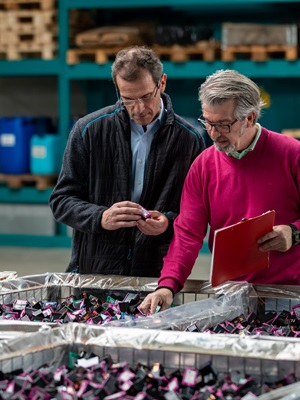As urban population and consumer culture significantly grow in the last few decades, the amount of waste generated increases continuously. Global waste is expected to surge by 70%, reaching 3.4 billion tonnes by 2050 from 2.01 billion tonnes in 2016.
With these contributing factors showing no signs of slowing down, communities are leveraging waste management technologies to reduce their environmental impact. In this article, we will explore how companies and cities are adopting innovative solutions for greener, more efficient waste management.
1. Pneumatic Waste Collection System
Many hospitals and warehouses already have pneumatic waste collection systems in place. Also called automated waste collection or pneumatic refuse collection, pneumatic waste collection is an innovative solution that eliminates the need for fuel-based trucks to pick up trash
Unlike traditional waste collection methods, it involves pneumatic waste pipes that form an underground waste collection system. With the help of valves, waste items that go through the tubes are propelled by high-pressure air to a designated, centralised destination. At the collection point, waste is segregated into distinct categories for composting, recycling and landfill disposal.
One example of pneumatic waste collection in action can be found in a residential development in Al Raha Beach, Abu Dhabi. With its fully computerised system and tightly sealed underground vacuum pipe network, no waste or odour escapes to the surrounding areas.
Another real-life application of this system can be seen in Songdo International Business District, where a combination of pneumatic pipes and IoT-enabled garbage disposal bins work together to collect waste straight from buildings.
2. E-waste kiosks
Improper disposal of electronic waste can result in toxic emissions that affect both human and environmental health. However, with e-waste recycling kiosks installed in numerous spots around the world, consumers can trade in their used electronics for cash, incentivising the proper disposal of e-waste.
A San Diego-based startup called ecoATM developed an automated kiosk to buy and recycle electronic devices. With over 5,000 ecoATMs installed across the US, it is easier than ever for people to sell their used gadgets whenever they like. Hence, it’s a win-win situation for both the environment and people’s pockets.
3. AI-powered Waste Sorting
Mistakes in segregation that lead to improper waste disposal can disrupt the recycling and reuse processes. To ensure that waste is detected and sorted into the right categories, advanced systems utilise sensors, cameras and algorithms. Because the process has been mechanised, sorting trash is no longer tedious and time-consuming.
Through cameras, automated garbage sorting systems track incoming waste. Sophisticated algorithms will then categorise them according to size, form and content.
Italy-based multi-utility firm HERA is a real-life example of AI-powered waste sorting. HERA partnered with IBM to create an AI-based solution that captures video of incoming waste and identifies trash automatically. By using smart waste management technology, it can identify incoming waste for reuse and recovery, keeping cities clean.
4. Smart waste bins
Smart waste bins help modernise waste management by using sensors that detect trash levels and alert users when they’re full. This doesn’t only allow people to monitor disposal habits but also optimise trash pickup scheduling for efficient fuel consumption.
One real-life example of smart waste bins is developed by a Poland-based company called bin-e. Their smart waste bins are placed at different public places, allowing people to simplify recycling by sorting and compressing waste automatically, controlling the fill level and processing data for seamless waste management.
5. Solar-powered trash compactors
Some waste management technologies don’t only improve waste disposal but also use clean energy. Solar-powered waste bins typically come with sensors for tracking fill levels, and some even have pre-installed compactors to hold more waste than traditional trash bins.
An example is Ecube Labs’ innovative waste management solution, which harnesses solar energy to compact trash. It can hold 5 times more waste than regular garbage bins and therefore eliminates the need for frequent emptying.
Because they use solar power, these trash compactors can be installed in both urban and remote areas. They help minimise the load on centralised waste disposal locations and make waste management more efficient.
The Future of Waste Management
From pneumatic waste collection systems to e-waste kiosks and AI-powered waste sorting, these advanced technologies play a game-changing role in waste management operations. They represent a significant step towards minimising environmental impact and promoting sustainability while boosting efficiency at the same time.
As the world’s climate problem continues to worsen, governments, businesses and the general public must all work together to reduce their waste and carbon footprint. By embracing waste management technologies and prioritising their implementation, we can address pressing environmental issues and build a cleaner and greener planet for future generations.
Posted 31/07/2024

















